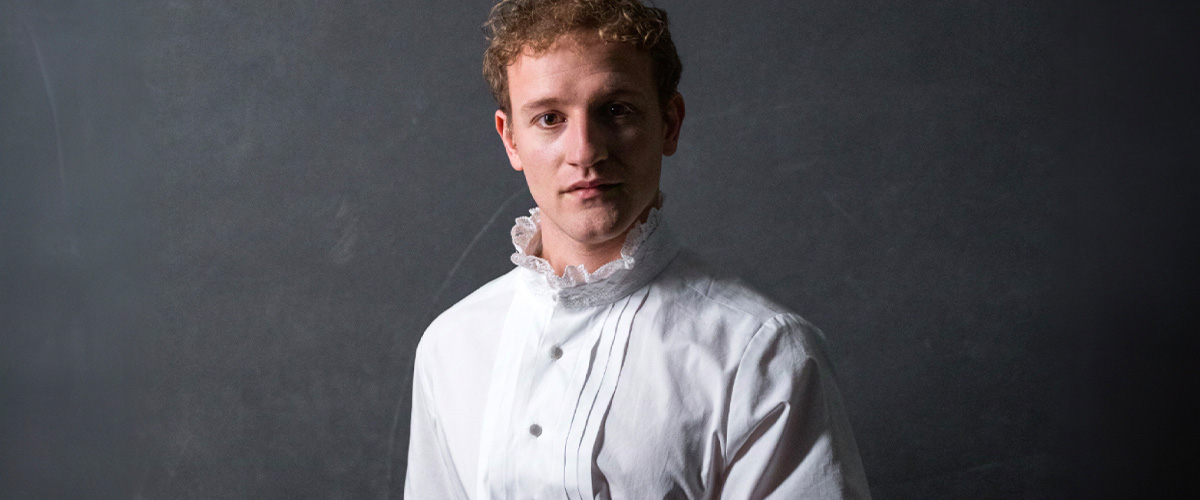
Federico Fiorio
Described by Opera Magazine as an “astonishing sopranista” with a “svelte, bright voice” and “fluent coloratura,” Federico Fiorio is rapidly gaining international attention as one of today’s most remarkable male sopranos, performing on many of the world’s leading stages.
In the 2025/26 season, he makes his Theater an der Wien debut as Darío in a new production of Pablo Luna’s Benamor, appears as Cleopatra in Hasse’s Marc’Antonio e Cleopatra with the Akademie für Alte Musik in Berlin, and sings Timante in Leonardo Leo’s Demofoonte at the Farinelli Opera Festival in Madrid.
Recent highlights include his 2025 Salzburg Festival debut as Sesto in a new production of Handel’s Giulio Cesare; a new staging of I Grotteschi at La Monnaie in Brussels; Bellezza in Handel’s Il Trionfo del Tempo e del Disinganno at the Opéra de Lausanne; Aquilio in Graun’s Adriano in Siria at the Aalto-Theater in Essen and the Musikfestspiele Potsdam Sanssouci; Pulgar in the world premiere of Alberto Carretero’s La Bella Susona at the Teatro de la Maestranza in Seville and Ópera de Tenerife; Enea in Galuppi’s Didone abbandonata at the Musikfestspiele Potsdam Sanssouci and the Auditorio Nacional de Música in Madrid; Aminta in Il Re Pastore at the Valletta Early Opera Festival; Nerone in L’incoronazione di Poppea and Sesto in a touring production of Giulio Cesare across major Italian theatres; Amanzio in Vivaldi’s Giustino at the Drottningholm Opera Festival; and a recital at the Handel Festival in Halle.
His repertoire also extends to concert performance, with appearances in Bach’s Mass in B minor at the MITO Festival and the countertenor part in Carmina Burana at the Teatro Massimo in Palermo and Teatro di San Carlo in Naples, where he also sang in the world premiere of Gaetano Manna’s La Cantata di San Gennaro.
A frequent collaborator of Ottavio Dantone, he has appeared with him as Andronico in Vivaldi’s Tamerlano, Lepido in Giacomelli’s Cesare in Egitto at the Innsbruck Festival, and Nerone in Handel’s Agrippina at the Seine Musicale in Paris, among others.
Born in Verona, Federico Fiorio studied with Lia Serafini and Patrizia Vaccari, graduating with honors from both the F. A. Bonporti Conservatory and the Parma Arrigo Boito Conservatory. He also worked with Roberta Invernizzi at the Giuseppe Gherardeschi International Academy for Organ and Early Music in Pistoia.
He began his musical path as a child soprano in Verona and has since retained his soprano voice. At 16, he made his debut as a male soprano soloist in the roles of Enea and Iarba in a pasticcio at the Teatro Ristori in Verona, following early stage experiences as Erster Knabe in Die Zauberflöte at the Teatro Filarmonico and as Lidio in Albinoni’s Zenobia, regina de’ Palmireni at the Teatro Malibran in Venice. In 2013, he recorded the album Come voce antica risuonano fili di luce with harpist Marina Bonetti.
He has since collaborated with distinguished conductors such as Leonardo García Alarcón, Giovanni Antonini, Ottavio Dantone, Diego Fasolis, Gabriele Ferro, Emmanuelle Haïm, Carlo Ipata, Dorothee Oberlinger, George Petrou, Giulio Prandi, Federico Maria Sardelli, Jordi Savall, and Jean-Christophe Spinosi. His work with stage directors includes projects with Lorenzo Amato, Fabio Ceresa, Leo Muscato, Chiara Muti, Pier Luigi Pizzi, Enrico Stinchelli, Dmitri Tcherniakov, and Rafael R. Villalobos.
In 2024, Federico Fiorio co-founded the Karalis Antiqua Ensemble. As artistic director and maestro concertatore, he leads the ensemble in its mission to rediscover and promote Renaissance and Baroque music across Europe.
September 2025
[Photo: Matthias Baus]